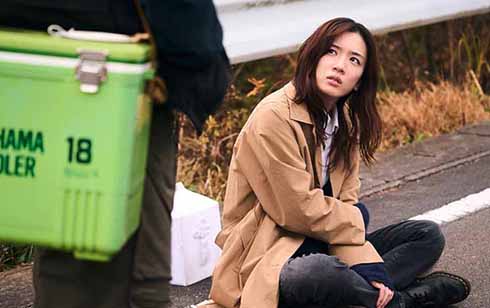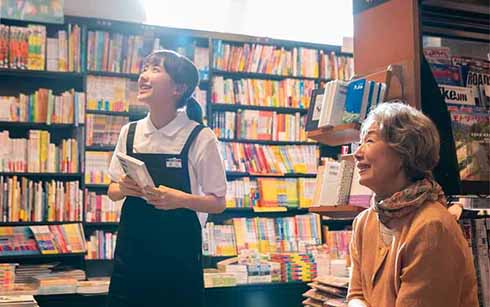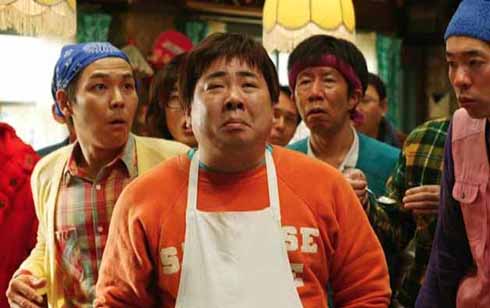WE MADE A BEAUTIFUL BOUQUET | MY BROKEN MARIKO | SOBAKASU | BL METAMORPHOSIS | THE HANDSOME SUIT | THE ZEN DIARY
Short reviews of some of the many films on offer in this year's Japanese Film Festival.
WE MADE A BEAUTIFUL BOUQUET. Masaki Suda, Kasumi Arimura. Directed by Nobuhiro Doi. Japan, 2021, 124 minutes, colour. This is a Japanese romance, very much of the 21st-century. This is a film for a young adult audience who appreciates the contemporary references to arts, entertainment and social media. While the film opens in 2020 with a symbolic discussion about two people sharing earphones to listen to music and the point made that each hears different aspects of the same music. As the film goes back and we follow the story of two young people who met on a chance encounter in the rain, missing the train, we realise that this is what is happening to them, bonding together but perceiving life from their particular earphone.
The film goes back to 2015, indicating the progress of the relationship year by year. The film also uses the device of showing the same episode from the point of view of each of the characters, their interpretation, inviting the audience to agree with both or, perhaps, prefer to respond to a particular perspective of one. The performances are joyful, the characters emerging from a certain younger shyness to a great bonding, shared contemporary culture, theatre, movies, television, social media, particular authors, particular personalities.
As they grow older, the demands of life and a sense of responsibility become important. It is interesting how the film shows the response of each, the young woman studying, getting a responsible job, but wanting something in which can be more per personally involved. The young man, on the other hand, finds it hard to get a job after many interviews, being drawn into business. With the consequent falling apart of the relationship, his wanting to propose but his traditional idea of marriage is not acceptable to her. A beautiful bouquet – but only temporary.
//////////////
 MY BROKEN MARIKO/ Mai burôkun Mariko ok. Mei Nagano, Nao Honda, Masataka Kubota, Toshinori Omi. Directed by Yuki Tanada. Japan, 2022, 87 minutes, colour. A story of friendship and sadness. The central character is a young woman, Shiino, who gets news of the suicide of her close friend, Mariko. She is distraught, wants to find out what happened, visits Mariko’s abusive father, steals the urn with the cremated ashes, takes them to the seaside town which was significant in their past.
MY BROKEN MARIKO/ Mai burôkun Mariko ok. Mei Nagano, Nao Honda, Masataka Kubota, Toshinori Omi. Directed by Yuki Tanada. Japan, 2022, 87 minutes, colour. A story of friendship and sadness. The central character is a young woman, Shiino, who gets news of the suicide of her close friend, Mariko. She is distraught, wants to find out what happened, visits Mariko’s abusive father, steals the urn with the cremated ashes, takes them to the seaside town which was significant in their past.
There are many flashbacks to childhood, to teenage years, to Mariko’s traumas, the support from Shiino, attempts of relationships, mental anguish and mental conditions . . . The other main character is a young man who encounters Shiino after her bag has been snatched by bike rider. He is kind to Shiino, encounters her in her troubles, tells his own story, and intervenes when Shiino encounters the snatcher pursuing another young woman. There is an upbeat ending of hope despite the sadness of Mariko’s life – and the criticism of Japanese patriarchy and domestic abuse.
//////////////
SOBAKASU. Toko Miura, Atsuko Maeda. Directed by Shinya Tamada. Japan, 2022, 104 minutes, colour. Kasumi is 30, works in a call centre, lives at home, the rather overbearing mother anxious for her daughter to be married and pressure from her married sister. The theme of this film is sexuality, or rather asexuality, a condition which affects a small percentage of the population. That is, men and women who feel no sexual attraction in their lives and are content with this, except for its consequent loneliness. They want to live their own lives, not without friendships, but satisfied with their own interior lives. Most people do not understand this.
Kasumi is tricked by her mother into going to an encounter with the young man and his mother, in view of a possible marriage. A friendship seems possible with much in common but, eventually, he intrudes on her sexuality. Finally, Kasumi asserts herself going to the beach where she often goes to sit in quiet contemplation of her own emotional situation.
//////////////
 BL METAMORPHOSIS. 2022. Mana Ashida, Nobuko Miyamoto. Directed by Shunsuke Kariyama. 115 minutes, colour. Sometimes we miss out on trends in various cultures. A quick Google search was needed to understand what BL stands for. BL, also known as boys’ love and its abbreviation BL (bieru), is a genre of fictional media originating in Japan that features homoerotic relationships between male characters. Apparently, it became popular in the 1970s in Japan, Thailand and other Asian cultures, featured in Manga stories and in Anime. And there was a dominance of women authors. So, an opening inquiring attitude as the film begins.
BL METAMORPHOSIS. 2022. Mana Ashida, Nobuko Miyamoto. Directed by Shunsuke Kariyama. 115 minutes, colour. Sometimes we miss out on trends in various cultures. A quick Google search was needed to understand what BL stands for. BL, also known as boys’ love and its abbreviation BL (bieru), is a genre of fictional media originating in Japan that features homoerotic relationships between male characters. Apparently, it became popular in the 1970s in Japan, Thailand and other Asian cultures, featured in Manga stories and in Anime. And there was a dominance of women authors. So, an opening inquiring attitude as the film begins.
In fact, the main feature of the film is a friendly relationship between a woman in her 80s and a young teenager. Yuki, is seen looking for a cookbook and attracted by the cover of one of the BL groups that she sees on the shelf. She buys it, to the apparent concern of the young teenager serving in the shop. Yuki returns for more, befriends the young girl who, herself, is a fan of this kind of book, has a whole collection home, eventually lending some to Yuki.
They chat, they visit, there is a young male friend, discussions of the story, the style, the illustrations, the relationships between the young men, the young woman deciding to create a booklet, its being published by a publisher and his son who come to Yuki who has calligraphy lessons. There is a chance encounter with the author of the first book – and happy connections, affirmations, friendships. It still leaves the audience wondering about BL stories but in a very happy frame of mind.
//////////////
THE HANDSOME SUIT/ HANSUMU SUTSU. Shosuke Tanihara, Muga Tsukaji, Keio Kitagawa, Mayumi Sada. Directed by Tsutomu Hanabusa. 2008, 115 minutes, colour. A broad Japanese comedy of 2008, still relevant. Audiences outside Japan do not often see this kind of popular Japanese-homespun comedy and moralising. A lot of talk about being ugly and being handsome throughout the film, so many people target those who do not live up to glossy magazine standards, being labelled as ugly.
 A genial large, but short, cook in the diner he has inherited from his mother and has a large following because of the skills in preparing the menu. But, his friends laugh at him as ugly. When a pretty young woman asks if a job is available, the friends all say yes, but our cook is hesitant, eventually saying yes. Then, she is so successful, crowds arrive. The cook is smitten but, when she asks him what appeals, his description is totally about her appearance. She rushes away.
A genial large, but short, cook in the diner he has inherited from his mother and has a large following because of the skills in preparing the menu. But, his friends laugh at him as ugly. When a pretty young woman asks if a job is available, the friends all say yes, but our cook is hesitant, eventually saying yes. Then, she is so successful, crowds arrive. The cook is smitten but, when she asks him what appeals, his description is totally about her appearance. She rushes away.
In the meantime, we have seen some clothing executives looking at footage and deciding that the cook is perfect for their experiment. They invite him to their shop, provide him with a ‘handsome suit’ which rather looks like a robot, the manager revealing that inside his handsome exterior he is very ordinary. What follows is a kind of jolly Jekyll and Hyde story. The cook at home as Jekyll, the cook in his handsome suit, Mr Hyde, becoming a model, promoted, top photography, encountering the star model, emotional ups and downs, living the high life, eliciting jealousy from a young would-be model, a near fatal exposure when he has a shower which the suit is not guarded against!
Needless to say, there will come a high conscience moment, the cook having achieved absolutely everything in rich society, in advertising society, the clothing manufacturers in offering him an everything-proof suit so that he can be secure and forever in this happiness. Moment of decision. There is an entertaining twist that the beautiful young woman at the opening of the film is the daughter of the suit manufacturer and it is she who has put on a fat suit because she likes the cook so much. Moral of the story, be happy with your true self, as you are.
//////////////
THE ZEN DIARY. Japan, 2022. Kenji Sawada, Fumi Dan. Directed by Yuji Nakae. 111 minutes, colour. This is a film adaptation of a 1978 book. Its central character, Tsutomu, lives alone on the mountaintop, cultivating vegetables, collecting fruits and mushrooms, cooks his meals with these natural ingredients and writes his cookbook. Sometimes, his editor/girlfriend Machiko visits him. An idyllic life but he is unable to bury his dead wife’s ashes (who died 13 years ago). In his young days, Tsutomu had been committed to a Buddhist monastery but had left at the age of 13. However, a lot of Buddhist principles and practice have remained with him. The film is quietly-paced, the routines of Tsutomu’s life, especially as the emphasis of the screenplay is on the changing seasons in Japan, the particular features, contributing to sowing, growing, harvesting.
He also visits his rather isolated and crusty mother-in-law, friendly, comparing notes, cooking, and listening to her complaints about her other family connections. And is visited by his in-laws who want to offload the problems with the crusty old lady on to him. The film is an invitation for audiences to enter into Japanese consciousness, Buddhist religious and cultural traditions, courtesies and respect, and the significance all some food and preparation and the effect for a healthy and prosperous life.